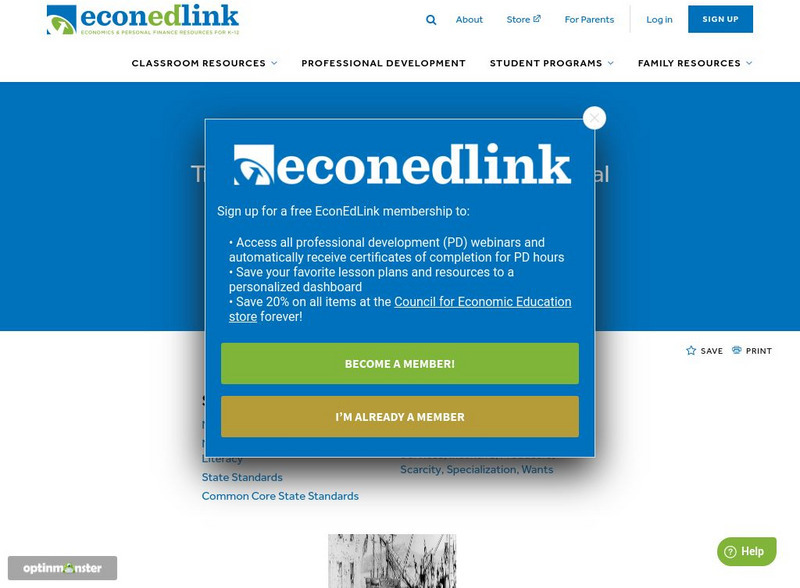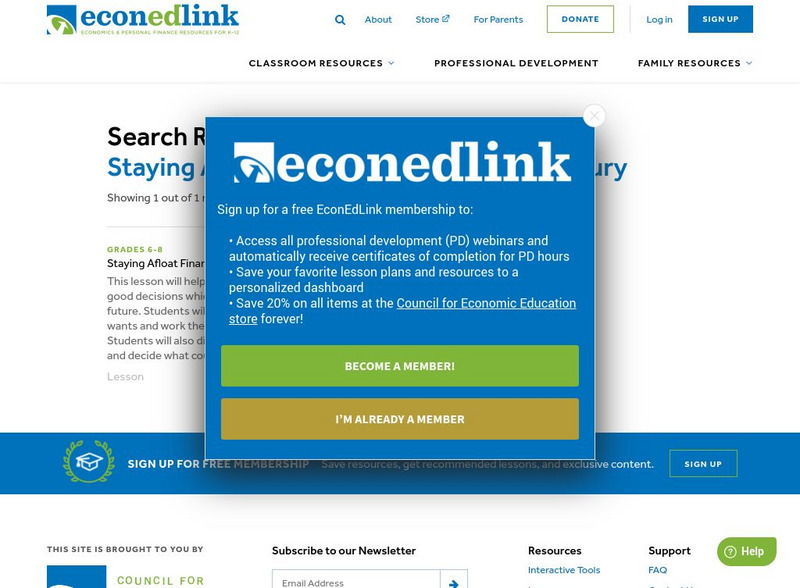Council for Economic Education
Econ Ed Link: Economic & Political Freedom (Grades 9 12)
In this lesson, students analyze the concepts of economic freedom and political freedom, identify ways to measure them and explore the relation between measures of well-being and between measures of freedom.
Council for Economic Education
Econ Ed Link: The Economics of Voting
Since the 1960s, many Americans eligible to vote have not bothered to do so- not even in presidential elections. Low rates of participation in voting have been worrisome to people interested in preserving our democratic traditions....
Council for Economic Education
Econ Ed Link: Classroom Cash Incentive Plan
Learn more about the economy through this informative lesson. "In this lesson, you will learn how the incentive program affects the personal choices you make in class. You will also analyze how economic incentives can affect behavior."
Council for Economic Education
Econ Ed Link: Clipping Coupons
Explore this website to find out how and why consumers make choices on what products to buy. Learn how producers entice consumers into buying their products. This is a very informative lesson plan.
Council for Economic Education
Econ Ed Link: Off to Interactive Island
This activity provides a fun way to explore concept of economic decision making. In the lesson, students are given a limited number of "tokens" and asked to exchange those tokens for goods in preparation for pioneering in a new land....
Council for Economic Education
Econ Ed Link: What Are Incentives?
Students will understand that incentives are used to encourage them to make good choices. After identifying incentives offered at home and in school, the students will distinguish between positive and negative incentives.
Council for Economic Education
Econ Ed Link: Opportunity Cost
Consumers are faced with tough choices because so many innovative and exciting products and services are available. Therefore, engraining a decision-making process that includes considering of opportunity cost is necessary to shape...
Council for Economic Education
Econ Ed Link: No Extra Room on the Mayflower
The students will explore the ideas of scarcity and choices by exploring a virtual model of the Mayflower. They will then pack a virtual suitcase making good choices about what they pack.
Council for Economic Education
Econ Ed Link: Be an Energy Saver
This activity focuses on the scarce and non-renewable nature of fossil fuels in order to stimulate student thinking about energy conservation. It emphasizes the fact that saving energy can be good for the wallet as well as the earth's...
Council for Economic Education
Econ Ed Link: Believe It or Not?
This lesson reveals to students how advertisers use words and images to make goods and services look their best. To protect consumers and make sure that competition among sellers is fair in the marketplace, the federal government...
Council for Economic Education
Econ Ed Link: To Buy or Not to Buy
While precise numbers are not known, it is believed the number of boycotts has grown markedly in the past fifty years. Consumers seem to be besieged by requests from special interest groups to refrain from buying certain goods and...
Council for Economic Education
Econ Ed Link: Community Helpers at Your Service
Show elementary students the correlation between goods and services and consumers. "You will draw a picture of a community helper, and perhaps write some sentences about him or her, to show or tell how that helper provides a Service."
Council for Economic Education
Econ Ed Link: We Are Consumers and Producers
This lesson plan is geared toward beginning economics concepts. "In this lesson you are going to learn more about how you and others are consumers and producers."
Council for Economic Education
Econ Ed Link: Booker T. Washington:"fifty Cents and a Dream"
Young Booker T. Washington had a dream. That dream was to use the resources at his disposal to earn the money necessary to get an education that would allow him and others to become financially secure. This lesson based on the picture...
American Forum for Global Education
American Forum for Global Education: Move, Feet, Move
Making good choices is the economic principle explored here at the American Forum for Global Education. Children learn to "identify alternative choices in conflict situations" through the use of verbal and nonverbal cues.
Council for Economic Education
Econ Ed Link: Sand Art Brownies
In this lesson, you will learn about substitute goods. You will have choices to make in your role as a shopper. In making these choices, you will decide whether you are willing to accept one good as a substitute for another or not. Are...
Council for Economic Education
Econ Ed Link: Bringing the Market to the Farm
This printable lesson discusses producers and consumers from an agricultural perspective. It focuses on choices that the consumer has with regard to purchasing agricultural goods (e.g. fruits and vegetables). As an example, it uses...
Council for Economic Education
Econ Ed Link: Costs and Benefits of 'The Three Little Pigs'
Find out what the definition of a cost and a benefit is in terms of the economy when using this site. "When making a decision, students should consider the costs and the benefits of that decision."
Council for Economic Education
Econ Ed Link: There Is Something in the Water
The United States is losing 60,000 acres of wetlands each year. Is this good or bad? Does anyone really want to live in swamps, fens, bogs, and marshes? Or is it better economics to drain the wetlands for other purposes like agricultural...
Council for Economic Education
Econ Ed Link: Trouble Is Brewing in Boston: "Colonial Voices Hear Them Speak"
It's December 16, 1773 and many of the citizens of Boston are furious with King George's new tax on tea. Young Ethan, a printer's errand boy, has been given the task of conveying information concerning an upcoming protest meeting. As he...
Council for Economic Education
Econ Ed Link: Staying Afloat Financially in the 21st Century
This lesson will help students identify how to make good decisions which will help them financially in the future. Students will identify how to take their own wants and work them into a form of a personal budget. Students will also...
Council for Economic Education
Econ Ed Link: Satisfaction Please! (Part I)
Even the savviest consumer has a problem with a good or service on occasion. It is a consumer's right to complain when there is a genuine problem. In some situations, it is also a consumer's responsibility. A problem can't be fixed if no...
Council for Economic Education
Econ Ed Link: Marketplace: Doing Business in Afghanistan
In May 2002, delegates from governments, international companies, and financial institutions met at a United Nations conference in Tehran to discuss the reconstruction of Afghanistan. Afghanistan's officials say that to create a viable...
Council for Economic Education
Econ Ed Link: Cpi the Crystal Ball
Governments and other financial organizations are constantly measuring trends in the economy to try to predict what will happen next. The ability to successfully predict economic trends has a profound effect on whether or not a business...









